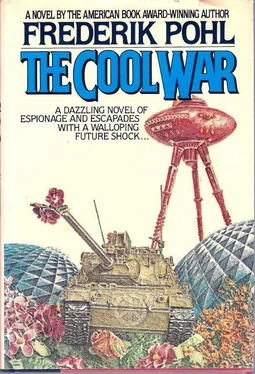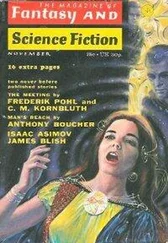The weather had turned hot. Hake walked slowly over to the church before the service, pacing himself to keep from working up a sweat or increasing his respiration—he did not want to breathe in any more of the smoggy air than he had to, especially with the special tinctures of the pizzeria next to the church. In this kind of weather he either ran at daybreak, when it was still cool, or gave up running entirely. He unlocked the church door and propped it wide.
It was an old church and a small one, but it was Hake’s own. His heart lightened as he went inside, studying the worn carpet, neatening the racks of name badges waiting for the congregation. The paint was chipping on the ceiling again. Hake frowned. The Team had been spendthrift in providing luxuries for his own use—the wind generator, new office furniture, beautifully functioning fittings in the bathroom, even a redone kitchen when bachelor Hake almost never cooked a meal. It was time they put a little of that money into the church. Perhaps new floor coverings so that they could give up the fundraising Carpet Capers. Next time he talked to Curmudgeon— But when would that be? And maybe—maybe, after this morning’s sermon, there would be no handouts from Curmudgeon ever again. That would be a pity, perhaps. But it would be better than living with guilt.
“As most of you know,” he began, “I spent several weeks in Europe last month, and it has made me think about the world. Some of what I’m thinking I don’t like. I look at the world, and I see a crazy kind of race where the way to win isn’t to run faster than the other guy but to trip him up. It isn’t war. But it isn’t peace, either, and it is degrading the quality of life for everybody, for ourselves as well as for the rest of the world.” Because of the warm spring weather, there were only about thirty-five people in the church, cross-legged on the floor, slouched on beanbag pillows or sitting properly erect at the benches along the sides of the room. They were all listening attentively—or, if not attentively, with that polite expression of passive acceptance that he had seen most Sunday mornings of his life from this pulpit. “Some of it is economic,” he said, “so that we play games with each others’ currencies, raiding the pound and speculating on the mark; dumping gold on the market when the dollar softens, and buying it up to hoard when the Russians or the South Africans or the Indians start to sell. Some of it is mercantile. We sell wheat for less than it costs to raise, to countries that ship us TV sets for less than they cost to make. And some of it—” he hesitated, looking at the words he had written down, looking for the courage to go beyond them—“some of it is psychological. We censure the Spaniards for not giving freedom to the Basques, and we snub the rest of the world for interfering with our own dealings with the Navajos.”
The eyes were glazing now, as he had known they would be, but doggedly he went on reciting statistics and explaining policies. Even Ted Brant, lying back against the beanbag, knees up, one arm possessively around Alys’s shoulder, the other hand resting on Sue-Ellen’s knee, was no longer looking hostile, only bored, while Alys was nodding at every point. It wasn’t agreement, really. She was just acknowledging the use Hake was making of the information she had supplied him. Hake went on with his catalogue: aid to defectors, support to dissidents, jamming of broadcasts, dumping of pollution—“those thousand-meter stacks get rid of our own pollution,” he said, “but only by throwing it up high enough so that it comes down on London and Copenhagen.” Allen Haversford was no longer glassy-eyed. The director of International Pets and ” Flowers was listening with full, if noncommittal, attention, and so, surprisingly, was Jessie Tunman.
Hake rounded into his moral. “What I have come to believe,” he said, “is that it is not enough not to be at war. We need more. We need tolerance and caring. We need to give credit to those who disagree with us for being perhaps wrong, but not villains. We need to accept diversity and encourage individuality. We need to abandon suspicion as a way of life, and turn away from either preemption or revenge. And we need to find within ourselves the solutions to the problems we make, instead of trying to make our own condition relatively better by making someone else’s relatively worse. And now,” he said, “Ellie Fratkin and Bill Meecham will entertain us with one of their lovely cello and piano duets.”
To the strains of Schubert—or maybe it was Kabalevsky, he had misplaced his notes and when Bill and Ellie played, all the selections sounded about the same—he sat on the platform and looked out over his congregation. To the extent that Hake had family, they were it. He knew them from the inside out—inside best, as he knew his adopted Uncle Phil not as the steely-eyed IRS examiner but as the hiccoughing and amiable drunk who showed up at one of his hospital stays with a wetting, weeping baby doll as a get-well present, having forgotten what sex his sister-in-law’s stepchild happened to be. Bland Teddy Cantrell, squatting like a Buddha and nodding to the music, would always be the tearful suicide-attempter who had set fire to Hake’s study with a starter’s pistol when his wife left him. One of the times his wife left him. The two gay Tonys, the stablest and most dignified couple in the church as they leaned shoulder-to-shoulder against the wall, had blubbered their hearts out to him while deciding to come out of the closet. How many of them had he reached with what he had had to say? And as the coffee came out and the parishioners drifted around, he listened to the comments. “Really elevating,” said the tall Tony, and the plumper, younger one said, “You always make me feel good, Horny.” Jessie Tunman: “I only wish you were that open-minded about other things, Horny.” Elinor Fratkin, hissing into his ear the moment she caught him alone: “I’m simply ashamed, Horny! How can I face William when you didn’t say that what we were playing was his own transcription of the Bach partita?” Frail old Gertrude Mengel, tottering to him on a cane: “Oh, Reverend Hake, if only my sister could be hearing you! It might have kept her off drugs.” Alys Brant, lingering next to him while Ted clutched her hand and stared resolutely away, “I loved the way you put it all together. When are we going to New York to finish the research?” Teddy Cantrell: “You’ve given us a lot to think about.” And just behind him, Allen Haversford, eyes hooded, stiffly shaking Hake’s hand: “You certainly have, and I want to talk to you about it at some length, Reverend Hake, but not just now.”
Did that sound like a threat? At least a warning? For better or worse, it was about the only sign he had that anyone had really listened to him. He went back to his home, spent the day fiddling with filing sermons and putting together reports for the Monday Board meeting, watched television for a while and decided to go to bed early; and when he flushed his toilet that night it spoke to him in Curmudgeon’s voice.
The essence of comedy is the incongruous thwarting of expectations. Hake saw his life as taking a comic turn. Kidnapped by a girl who had tried to lure him into a toilet. Funny! The real guns didn’t make it less funny, they only turned the humor black. Sneezing western Europe into an economic tremor, what could be funnier than that? And now being given cloak-and-dagger orders by another toilet, that was hilarious—after it had stopped being startling, anyway.
When you looked at the appliance itself there was nothing particularly funny about it. Squat, solid and almost majestic in heather-blue ceramic, it looked like a superbly engineered device for exporting a person’s excretory byproducts as decently and as rapidly away from the person himself as anyone could wish. And nothing more. And in fact it was all of that, but something more. The bottom of the flush tank was four inches thick. Whatever was inside was concealed by the seamlessly molded ceramic, but from a palm-sized metal grille underneath the tank the voice came. The flushing lever was resilient black plastic, attractively scored with a moire surface. It did not look as if it could recognize Hake’s thumbprint. But it could. Hake experimented in fascination. Flush with his “finger, flush with his fist, nothing happened—except that the water in the bowl quietly scoured and drained itself away. Flush with his thumb, as the design invited one to do, and he had established contact with Curmudgeon himself.
Читать дальше












